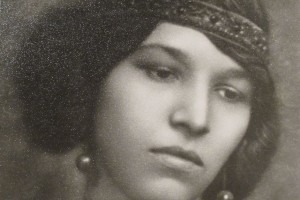
Jelly D’Aranyi
The young Australian soldier was Frederick Septimus Kelly, born in Sydney in 1881. After receiving his initial education at Sydney Grammar School he was sent to England and educated at Eton College. Awarded a musical scholarship at Oxford in 1899, he went to study with Ernest Walker at Balliol College. He soon established his musical credentials as a composer and pianist and performed with, amongst others, Pablo Casals. Concordantly, he was one of the best amateur rowers of the times, not only competing for Oxford but also winning the gold medal in the 1908 Olympics. His young love was none other than Jelly D’Aranyi, the Hungarian star violinist and grand- niece to Joseph Joachim. They met in 1909 when Jelly was merely 16 years old, and they soon began to perform together. Initially, Frederick thought of Jelly as his younger sister and “had very warm feelings towards her, but Jelly was totally smitten with him.”

Frederick Septimus Kelly
Frederick Septimus Kelly: Violin Sonata in G Major, “Gallipoli”
Kelly’s happy days in London were short lived as he was sent back to the war in France. Originally, he was placed in charge of improving the standards of the military band, but with the Somme Offensive brewing, he was moved to the front lines. He died at Beaucourt-sur-l’Ancre while rushing a German machine gun post in the last days of the Battle of the Somme in November 1916. During his memorial service Jelly D’Aranyi played their violin sonata. And 10 days after his death, “she wakes up at 2am and hears the first theme of the violin sonata being played, as if by a very bad violinist or a beginner.” According to D’Aranyi, “it sounded like it was coming across a very large body of water, and it was Kelly’s way of saying goodbye to me.” Jelly D’Aranyi kept Frederick’s photograph on her piano for the rest of her life, and despite numerous proposals, she never married!
